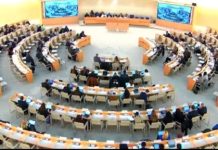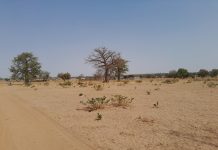By Kebba Jeffang The Chairperson of the African Commission on Human and Peoples’ Rights (ACHPR) on Thursday, 23rd April, 2015 presided over the launching of the ‘Study on Nationality’ in Africa as part of the events marking the Commission’s 56th Ordinary Session. Presenting the Study to the delegates, Honourable Commissioner Maya Sahli Fadel said the issue of Nationality is a matter of grave concern and an increasing trend in the global society, particularly on the African continent. She said it is discriminatory for a person to be without nationality because this means the said individual has no document and that in the case of death he/she has no proof to indicate where he or she comes from. Madam Fadel said the right to nationality is recommended by the United Nations Charter on Human and Peoples’ Rights, African Charter on Human and People Rights as well as other important human rights instruments but added that it is still a prevailing unresolved issue on the continent. She thanked Ivory Coast and Senegal for being the fore front countries in this respect, adding that there is a very little improvement in Africa. “There are people who are living without legal documents. They cannot do work or banking etc. The statelessness and the issue of nationality are becoming rampant and it is mainly due to persecution and it is against the African Charter,” said Madam Fadel She said many countries in Africa should amend their nationality laws as Senegal did in making sure that there is no person in Africa without a state. She urged countries to ratify the protocol and stop the violation of human rights. Mr. Elhabid Yadkan, representing the Political Bureau of African Union, said the right to nationality is not the right of nationality and therefore should be respected by the African nations. He said compliance to this at the national level will lead to the harmonization of the citizens, adding that statelessness is a major challenge on the African continent. He said the protocol on nationality provides that it should start from birth. “The ultimate objective of the protocol and the study on nationality is to ensure that statelessness is eradicated and shall be added to the international instruments. The draft protocol is at the advance stage and it shall be submitted to the African Commission very soon for adoption,” revealed Yadkan. Madam Emmanvelle Mitte, statelessness expert from the United Nations High Commission for Refugees (UNHCR) Regional Office in Dakar, Senegal, disclosed that sixty percent (60%) of the stateless persons in the world are children and that every ten minutes a stateless person is born. She indicated that they have a challenge as many states do not provide them with statistics. “70 years ago, the UN Charter stated that every person is entitled to a nationality. Africa has a major gap compared to other continents. However, there is hope that many countries pledged to amend their constitutions to make nationality to start at birth,” she said. The UNHCR representative called on the states to join the campaign to eradicate statelessness in a very short time. “I also urged for ratification and I called upon the African Commission to urge the states to summit their statelessness report regularly,” said Madam Mitte. In her statement, Honourable Kayitesi Zainabo Sylvie, the Chairperson of the African Commission on Human and Peoples’ Rights (ACHPR), said the issue of statelessness is a concern to the Commission as it is a grave violation of the right of a person. She asked “if a person has no legal country, what type of person is that? That is just a human being in front of you.” ACHPR Chairperson urged all the states to speed up and ratify “this very important protocol.” She concluded that laws should provide a nationality right to children, husbands and wives as a citizen of any country where one partner comes from without any restriction. ]]>
Study on ‘Nationality’ Launched at African Commission in Banjul
Facebook Notice for EU!
You need to login to view and post FB Comments!





















